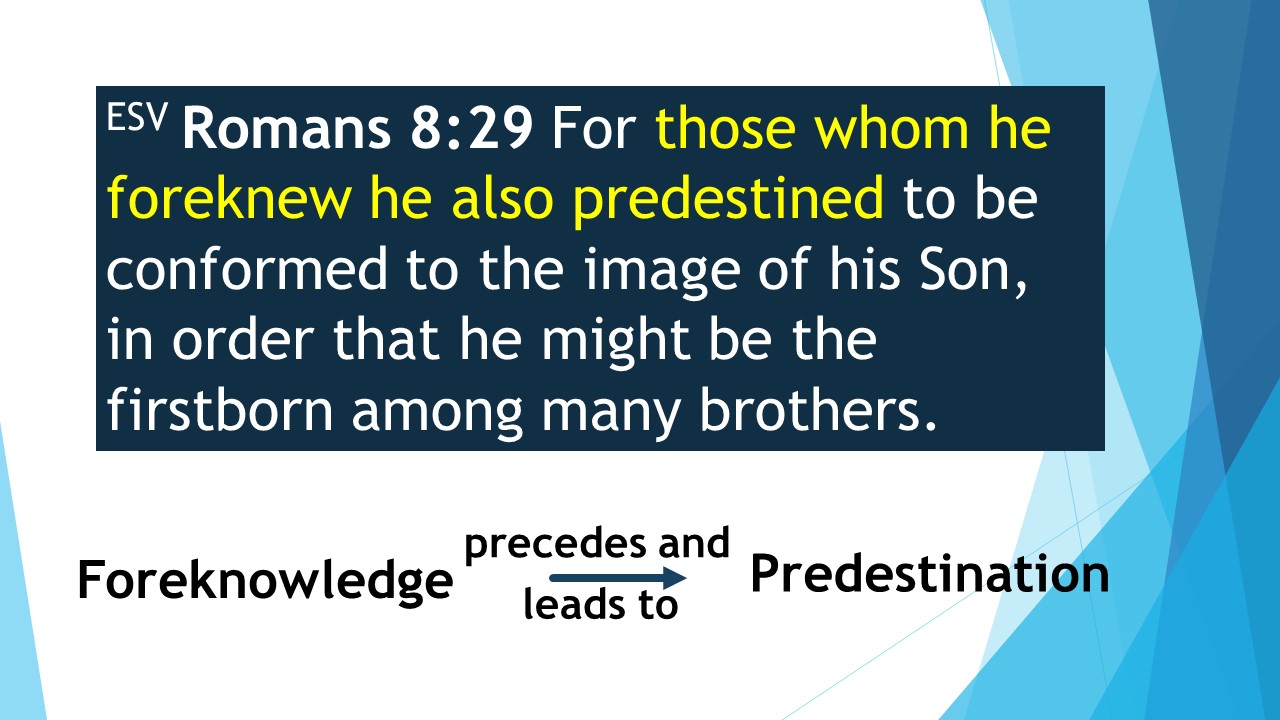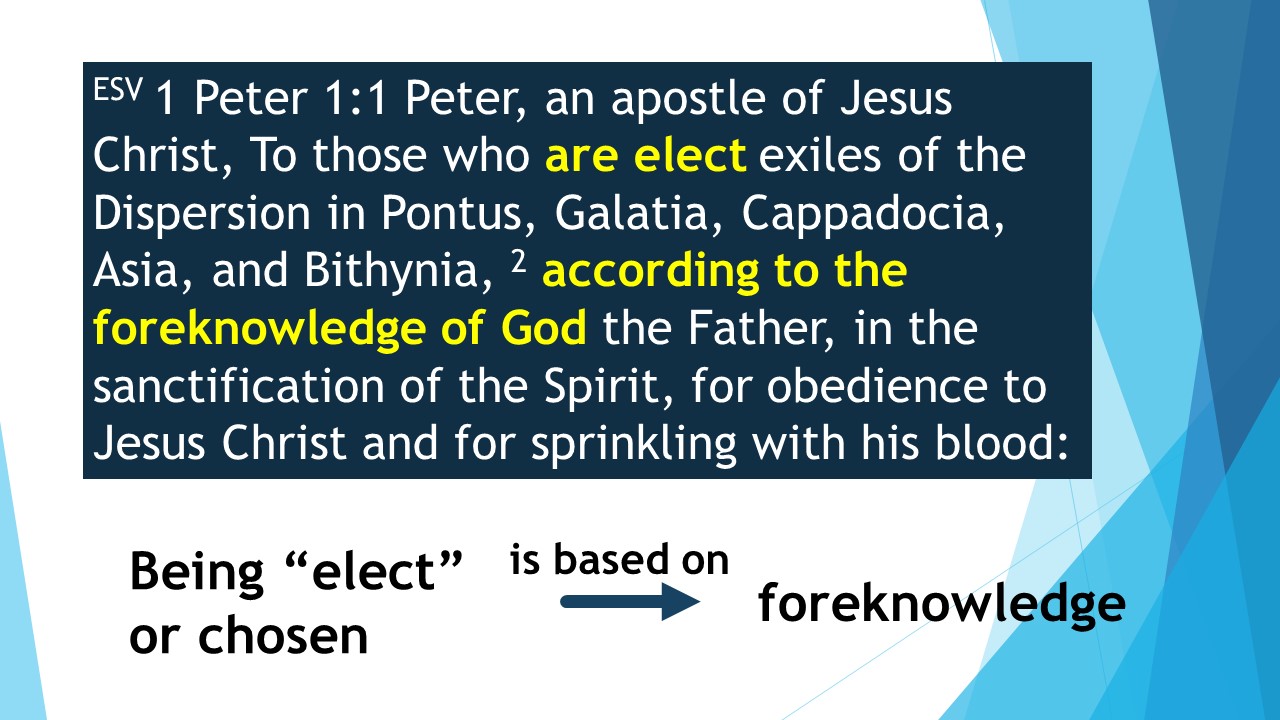- Jun 1, 2017
- 893
- 744
- 59
- Country
- United States
- Faith
- Christian
- Marital Status
- Married
Most Christians sooner or later struggle with questions about predestination.
Many Christians don’t like the idea of predestination because it feels unfair. I think the problem is not with predestination itself, but with a lack of understanding about how predestination is related to foreknowledge. Once we understand what the Bible says about predestination and foreknowledge, it is easy to see how predestination is actually a good and encouraging truth which is entirely consistent with God’s justice, love, and even with our free will.
There are two Bible passages which explicitly link God’s foreknowledge with predestination. The first passage is Romans 8:29.

This passage shows us several things about predestination and foreknowledge:
1. The foreknowledge is knowledge related to people, as indicated by the phrase “those whom.”
2. This foreknowledge in some way logically precedes and leads to predestination.
3. The passage does NOT say that God predestines who will have faith.
4. The passage DOES say that God makes a destiny for us whom He foreknew, and that destiny is to become like Jesus.
The second passage which links foreknowledge and predestination is 1 Peter 1:1-2.

This passage shows us some truths similar to the truths we saw in Romans:
1. Being “elect” (which pretty much everyone agrees is the same thing as being chosen or predestined) is based on God’s foreknowledge. That’s what “according to the foreknowledge of God the Father” means.
2. The passage does NOT say that God chooses who will have faith.
3. The passage does indicate that election has to do with both sanctification and forgiveness. Sanctification is the process where we become more and more like Jesus, so this is the same thing that Paul described in Romans 8:29 using the words “to be conformed to the image of His Son”.
What Specific Foreknowledge Leads to Predestination?
The Bible does not specifically tell us. We can’t say for sure. But I think it is possible that Paul and Peter were both referring to the fact that God knew ahead of time who, given the right opportunities and circumstances and help from Him, would freely accept Jesus Christ as Lord and Savior.
In other words, I don’t think the Bible is teaching that God predetermined who would have faith in Jesus. Rather, I think the Bible is teaching that God knew ahead of time who would have faith in Jesus. Then, based on that knowledge, God made a plan (a destiny, a predestination) for these people that their sins would be forgiven and they would be transformed to become like Jesus, and they would live in glory with God forever.
When you understand predestination in this way, you immediately realize that there is nothing unfair about it. In fact, you see that it is an amazing act of love. Even though we have faith in Jesus, we never could have saved ourselves. We never could have changed ourselves from being sinful people to being people who are like Jesus. But God makes sure this happens for everyone whom He knew would be willing to accept Him.
My destiny is not in doubt, and neither is yours, if you believe in Jesus. Predestination is wonderful! Thank God for predestination! God has chosen our destination, and it’s a really good one!
What Does This Have to Do With Calvinism and Arminianism?
You don’t have to understand the terms “Calvinism” and “Arminianism”. These terms are not in the Bible. However, since many Christians use these terms, you might want to know a little about them. These terms refer to two ways of understanding how predestination works. There’s more to Calvinism and Arminianism than predestination, but predestination is an important part of the issue.
The view I just shared above has a technical name: “conditional election.” This view, which represents my best effort to understand the Bible on this issue, is consistent with Arminianism. That doesn’t mean that I am committed to the full system of beliefs which are related to Arminianism, but it does mean that I lean toward an Arminian understanding of predestination.
Calvinists understand the Bible to teach “unconditional election.” They believe that God chose ahead of time who would have saving faith and who would not, and that God’s choice had nothing at all to do with anything He knew ahead of time about what each person would do or would be like.
Since I Lean Towards Arminianism, How Do I Feel About Calvinists?
I thank God for my brothers and sisters in Christ who are Calvinists. Although we disagree on some points of doctrine, we share a common faith in our Lord and Savior Jesus Christ. We are on the same team! I have been greatly blessed by the preaching, teaching, and writing ministries of men like John Piper and Wayne Grudem, both of whom are Calvinist. For me, learning from them is like eating a fish. You eat the meat and throw out the bones. In the case of these men, I have found them serving up huge amounts of delicious, nutritious fish meat which rarely contains more than a few small bones. They are advancing the work of God, and I thank God for them. I feel the same way about less famous Calvinists I know.
It’s fine to discuss issues like this, and they are not unimportant, but I hope Christians will not divide over issues like Arminianism vs. Calvinism. Sadly, some do. I am hoping we can have a discussion that will be peaceful, respectful, and helpful, even as we may strongly disagree on some issues. I also hope that those who are relatively new to this issue will feel free to share thoughts and questions so that the discussion is not dominated by a few of us who have already thought about this a lot.
Giving Thanks Together
Finally, all of us, Calvinists and Arminians alike, should thank God for His great grace, and specifically, that He made a plan for our salvation and uses His great wisdom and power to ensure that plan succeeds.
This OP is a modified version of a post on my blog.
Many Christians don’t like the idea of predestination because it feels unfair. I think the problem is not with predestination itself, but with a lack of understanding about how predestination is related to foreknowledge. Once we understand what the Bible says about predestination and foreknowledge, it is easy to see how predestination is actually a good and encouraging truth which is entirely consistent with God’s justice, love, and even with our free will.
There are two Bible passages which explicitly link God’s foreknowledge with predestination. The first passage is Romans 8:29.

This passage shows us several things about predestination and foreknowledge:
1. The foreknowledge is knowledge related to people, as indicated by the phrase “those whom.”
2. This foreknowledge in some way logically precedes and leads to predestination.
3. The passage does NOT say that God predestines who will have faith.
4. The passage DOES say that God makes a destiny for us whom He foreknew, and that destiny is to become like Jesus.
The second passage which links foreknowledge and predestination is 1 Peter 1:1-2.

This passage shows us some truths similar to the truths we saw in Romans:
1. Being “elect” (which pretty much everyone agrees is the same thing as being chosen or predestined) is based on God’s foreknowledge. That’s what “according to the foreknowledge of God the Father” means.
2. The passage does NOT say that God chooses who will have faith.
3. The passage does indicate that election has to do with both sanctification and forgiveness. Sanctification is the process where we become more and more like Jesus, so this is the same thing that Paul described in Romans 8:29 using the words “to be conformed to the image of His Son”.
What Specific Foreknowledge Leads to Predestination?
The Bible does not specifically tell us. We can’t say for sure. But I think it is possible that Paul and Peter were both referring to the fact that God knew ahead of time who, given the right opportunities and circumstances and help from Him, would freely accept Jesus Christ as Lord and Savior.
In other words, I don’t think the Bible is teaching that God predetermined who would have faith in Jesus. Rather, I think the Bible is teaching that God knew ahead of time who would have faith in Jesus. Then, based on that knowledge, God made a plan (a destiny, a predestination) for these people that their sins would be forgiven and they would be transformed to become like Jesus, and they would live in glory with God forever.
When you understand predestination in this way, you immediately realize that there is nothing unfair about it. In fact, you see that it is an amazing act of love. Even though we have faith in Jesus, we never could have saved ourselves. We never could have changed ourselves from being sinful people to being people who are like Jesus. But God makes sure this happens for everyone whom He knew would be willing to accept Him.
My destiny is not in doubt, and neither is yours, if you believe in Jesus. Predestination is wonderful! Thank God for predestination! God has chosen our destination, and it’s a really good one!
What Does This Have to Do With Calvinism and Arminianism?
You don’t have to understand the terms “Calvinism” and “Arminianism”. These terms are not in the Bible. However, since many Christians use these terms, you might want to know a little about them. These terms refer to two ways of understanding how predestination works. There’s more to Calvinism and Arminianism than predestination, but predestination is an important part of the issue.
The view I just shared above has a technical name: “conditional election.” This view, which represents my best effort to understand the Bible on this issue, is consistent with Arminianism. That doesn’t mean that I am committed to the full system of beliefs which are related to Arminianism, but it does mean that I lean toward an Arminian understanding of predestination.
Calvinists understand the Bible to teach “unconditional election.” They believe that God chose ahead of time who would have saving faith and who would not, and that God’s choice had nothing at all to do with anything He knew ahead of time about what each person would do or would be like.
Since I Lean Towards Arminianism, How Do I Feel About Calvinists?
I thank God for my brothers and sisters in Christ who are Calvinists. Although we disagree on some points of doctrine, we share a common faith in our Lord and Savior Jesus Christ. We are on the same team! I have been greatly blessed by the preaching, teaching, and writing ministries of men like John Piper and Wayne Grudem, both of whom are Calvinist. For me, learning from them is like eating a fish. You eat the meat and throw out the bones. In the case of these men, I have found them serving up huge amounts of delicious, nutritious fish meat which rarely contains more than a few small bones. They are advancing the work of God, and I thank God for them. I feel the same way about less famous Calvinists I know.
It’s fine to discuss issues like this, and they are not unimportant, but I hope Christians will not divide over issues like Arminianism vs. Calvinism. Sadly, some do. I am hoping we can have a discussion that will be peaceful, respectful, and helpful, even as we may strongly disagree on some issues. I also hope that those who are relatively new to this issue will feel free to share thoughts and questions so that the discussion is not dominated by a few of us who have already thought about this a lot.
Giving Thanks Together
Finally, all of us, Calvinists and Arminians alike, should thank God for His great grace, and specifically, that He made a plan for our salvation and uses His great wisdom and power to ensure that plan succeeds.
This OP is a modified version of a post on my blog.

